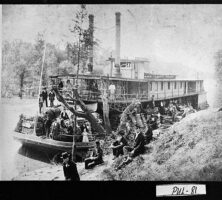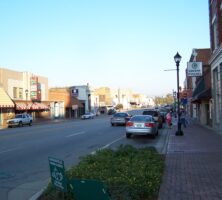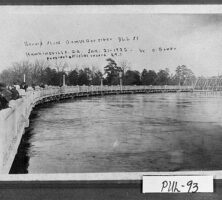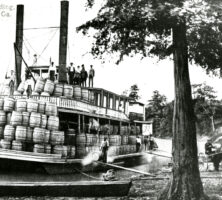The seat of Pulaski County, Hawkinsville lies in south central Georgia on the banks of the Ocmulgee River.
Situated about forty-six miles south of Macon, Hawkinsville plays a significant role in the state’s agriculture, industry, and tourism sectors. According to the 2020 U.S. census, Hawkinsville’s population was 3,980.

Ten highways run through the town, which is nicknamed Hub City and Georgia’s Highway Hub. This intersection of state and federal highways provides Hawkinsville industries, which include textiles and paper, convenient access to Georgia’s ports. Artist Nell Choate Jones is a native of Hawkinsville.
History
Hawkinsville is named for Colonel Benjamin Hawkins, who served as the principal temporary agent for Indian affairs south of the Ohio River from 1796 until 1803, when he became the principal agent for the Creeks. Hawkins’s close relationship with the Creek Nation—he lived among them and eventually married a Creek woman—helped to preserve peace between the Native American people and the newly formed United States.
At the time of its incorporation in 1830, Hawkinsville relied heavily on Pulaski County’s agriculture, which also produced timber and corn. However, much of the city’s prosperity depended on the Ocmulgee River. During most of the nineteenth century, Hawkinsville, situated in the heart of the cotton belt, served as one of Georgia’s first wholesale centers as poleboats, steamboats, and timber rafts shipped freight and passengers down the Ocmulgee to the Altamaha River and on to the towns of Darien and Brunswick.

Trade via the Ocmulgee reached its heyday during the first four decades of the century. During the 1850s, however, river commerce competed heavily with Georgia’s rapidly spreading railroads. After Union general William T. Sherman destroyed much of the railroad system during his march to the sea in 1864, the Ocmulgee saw a resurgence of traffic to the coast. During the last three decades of the nineteenth century, Hawkinsville served as the upriver terminus for most of the steamboats traveling the Ocmulgee.
Historically a boon to Hawkinsville’s economy, the Ocmulgee also repeatedly reminded citizens of nature’s power. In January 1925 a freshet significantly damaged the timber industry as waters rising one inch per hour crested at 36.6 feet, felling trees, submerging sawmills, and sweeping cut lumber downstream. The 1925 freshet remained the highest water level on record for almost seventy years. Then in July 1994, after tropical storm Alberto dumped rain across Georgia, the Ocmulgee crested first in Macon and then in Hawkinsville, where it reached a record 41.9 feet, almost seventeen feet above flood stage. Thanks to advance warnings and quick preparations, the flood claimed no lives. However, travel east from Hawkinsville came to a halt, caskets in the city’s Orange Hill Cemetery emerged from the ground, and thirty homes were flooded.

In 2007 the Sam Way, Sr. Learning Center, a satellite campus of Central Georgia Technical College, opened in Hawkinsville.
Equestrian Center
Over the years Hawkinsville has established itself as an equestrian center. Organized in 1894, the Pulaski County Fair Association featured among its annual livestock expositions speed demonstrations of trotters and pacers. In the 1920s the Fair Association constructed new livestock buildings, a racetrack, and an athletic field. By 1926 harness horsemen from across the country had chosen Hawkinsville as a winter training venue.
During the middle part of the twentieth century Hawkinsville rescheduled its harness races from the fall to the spring, and in 1974 the city hosted its first Harness Festival. In 1975 Hawkinsville won a grant to construct the Lawrence L. Bennett Harness Horse Training Facility, which opened in 1977. During the winter months horsemen from across the United States train at the Lawrence Bennett facility because of the area’s mild climate and natural clay track. The Harness Festival’s exhibition races begin the harness-racing season.
Historic Landmarks
Hawkinsville boasts several historic landmarks, but the centerpiece of the city’s historic preservation efforts is the Old Opera House. Completed in 1908, the building originally served as the city hall and auditorium. Numerous productions took place during the early twentieth century on the auditorium’s 75-foot stage and usually brought in audiences large enough to fill the building’s 576 seats. Oliver Hardy is said to have once performed there. Over the years the facility also accommodated worship services for congregations whose churches were under construction. In the 1950s the auditorium showed films after the local movie theater burned.

The Old Opera House has undergone two renovations and now boasts advanced lighting, sound, projection, and telecommunications systems. Today the home of the Hawkinsville–Pulaski County Arts Council, the Old Opera House hosts regular dramatic performances, ceremonies, and meetings, all of which draw audiences from across the state.












